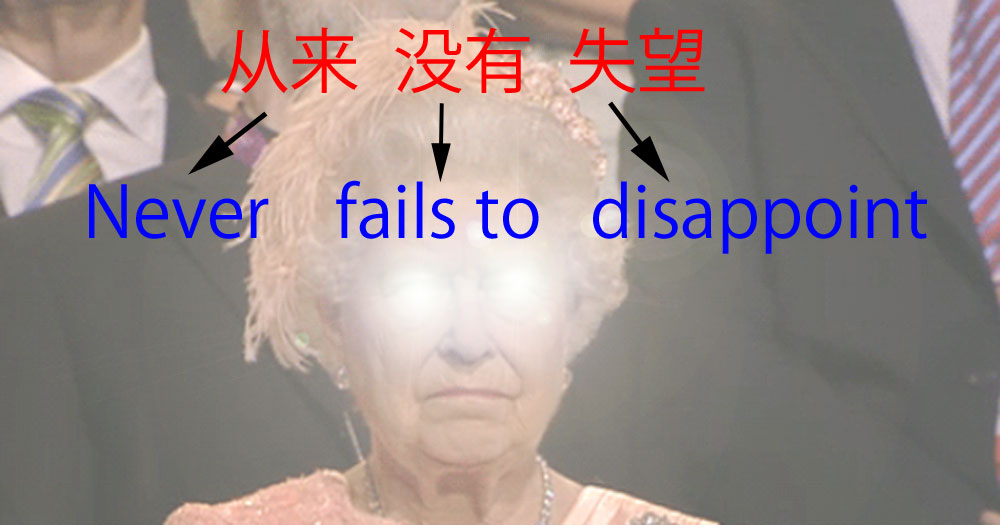Two young Singaporeans were publicly judged for making the same unforced English language faux pas recently.
On separate social media posts in praise of completely different products, the two Singaporean influencers each used the phrase "never fails to disappoint" to mistakenly mean they were never let down by the products they were helping to upsell.
Naturally, mockery ensued.
Never fails to disappoint is a bad thing
For the initiated, "never fails to disappoint" means the exact opposite of what they had intended: It is tantamount to saying the products are disappointing all the time.
They should have used the phrase "never fails to satisfy" instead.
Or simply, "never disappointed".
More than just a coincidence
The strange thing is that there are probably many other instances of "never fails to disappoint" being used as a form of praise in Singapore that have escaped public scrutiny.
At the same time, "never fails to disappoint" has a strange, familiar ring to it. It somehow feels intuitively correct, but it is, in fact, very wrong as a form of praise.
Putting aside the explanation this has all been a coincidence so far, where influencers basically slavishly copy one another's pre-packaged phrases and slogans unthinkingly, the question that would be interesting to answer is: Why do young Singaporeans, or Singaporeans in general, end up saying "never fails to disappoint"?
Is it a millennial thing?
Here are two competing explanations about how this curious usage of a common English phrase came to be these days.
[related_story]
Two competing explanations
1. Mistaking the phrase as a double negative
Double negatives are common enough in English and are used informally. For example: I don't dislike this dish.
In this instance, a double negative is employed to not outwardly praise something. It is kind of like a passive-aggressive way to go about saying something.
The spirit of such a usage is geared more towards a backhanded compliment than an outwardly enthusiastic praise.
Two negatives form a positive, or as the rule goes.
So, when applied to the "never fails to disappoint" phrase, there can be two convenient ways to cut it up:
a. Never fails to disappoint
b. Never fails to disappoint
Unfortunately, as convenient and tempting as it is to splice the phrase in these ways, unconsciously or not, it is wrong and still conveys a negative message.
This is because:
a. Never fails to disappoint = Never satisfies
b. Never fails to disappoint = Succeeds in disappointing
So, if this is indeed the source of the error, it is a clear demonstration of a poor understanding of English.
How plausible-sounding is this explanation? Sounds iffy, so we'll move on.
2. Thinking in Chinese but speaking in English
A more gratifying explanation could be due to how Singaporeans, by and large, are effectively not very bilingual, after years of rote learning languages to achieve minimal proficiency.
One downside of possessing half-baked English and Chinese language skills is that one becomes the master of none.
It ends up cultivating heuristics when it comes down to using the languages almost unconsciously in day-to-day life.
So, it is highly likely that a Mandarin-speaker is thinking the phrase, "从来没有失望", and due to a short cut in mapping words, allows it to correspond to "never fails to disappoint".
For the benefit of non-Chinese readers, the literal one-for-one translation is:
从来没有 (cong lai mei you) = Never before
失望 (shi wang) = Disappointed
Moreover, "没有" (mei you) means "no", and its placement in the middle of the Chinese phrase can correspond to "fails to".
Therefore, going from "never before disappointed" to "never fails to disappoint" is slippery and the likely source of the confusion, and not that far a stretch because our mammalian brain is just not cut out for this sort of mental gymnastics.
This is, by far, the most gratifying explanation as to how "never fails to disappoint" gets confused for being a phrase that is used to praise.
An alternative theory: Students heard their teachers say it
A check with younger colleagues in Mothership.sg suggests younger Singaporeans might have picked up "never fails to disappoint" in school.
According to one of our younger colleagues in her early 20s, it is normal for teachers to blurt out in class -- when they are miffed -- that the students "never fail to disappoint" the teachers.
This gives the impression that the students have succeeded in their objective.
So, the connotation is that it is a phrase to praise someone for fulfilling an objective without fail.
We're not too sure if this explanation works, but we'll just leave it here.
Are theories testable?
Surprisingly, yes.
If the prevalence of "never fails to disappoint" as a phrase is higher among the English-Mandarin-speaking population, it can be isolated as a phenomenon that afflicts Chinese Singaporeans.
It should show up in social media posts, text messages and chat logs more frequently in the Chinese Singaporean population than, say, the population of speakers of English and Malay, for instance.
Or maybe those who are inclined to say "Never fails to disappoint" are also prone to saying "Yesterday you go where?", which is basically another hallmark of thinking in Chinese but expressing in English.
Here are some totally unrelated but equally interesting stories:
Uzbekistan is such a beautiful country it sounds like Us Back In An Instant
Want to low-key persuade your child to be a mini eco-warrior? We got your back.
S’poreans to know in real-time how much water they’re using when showering
If you like what you read, follow us on Facebook, Instagram, Twitter and Telegram to get the latest updates.
